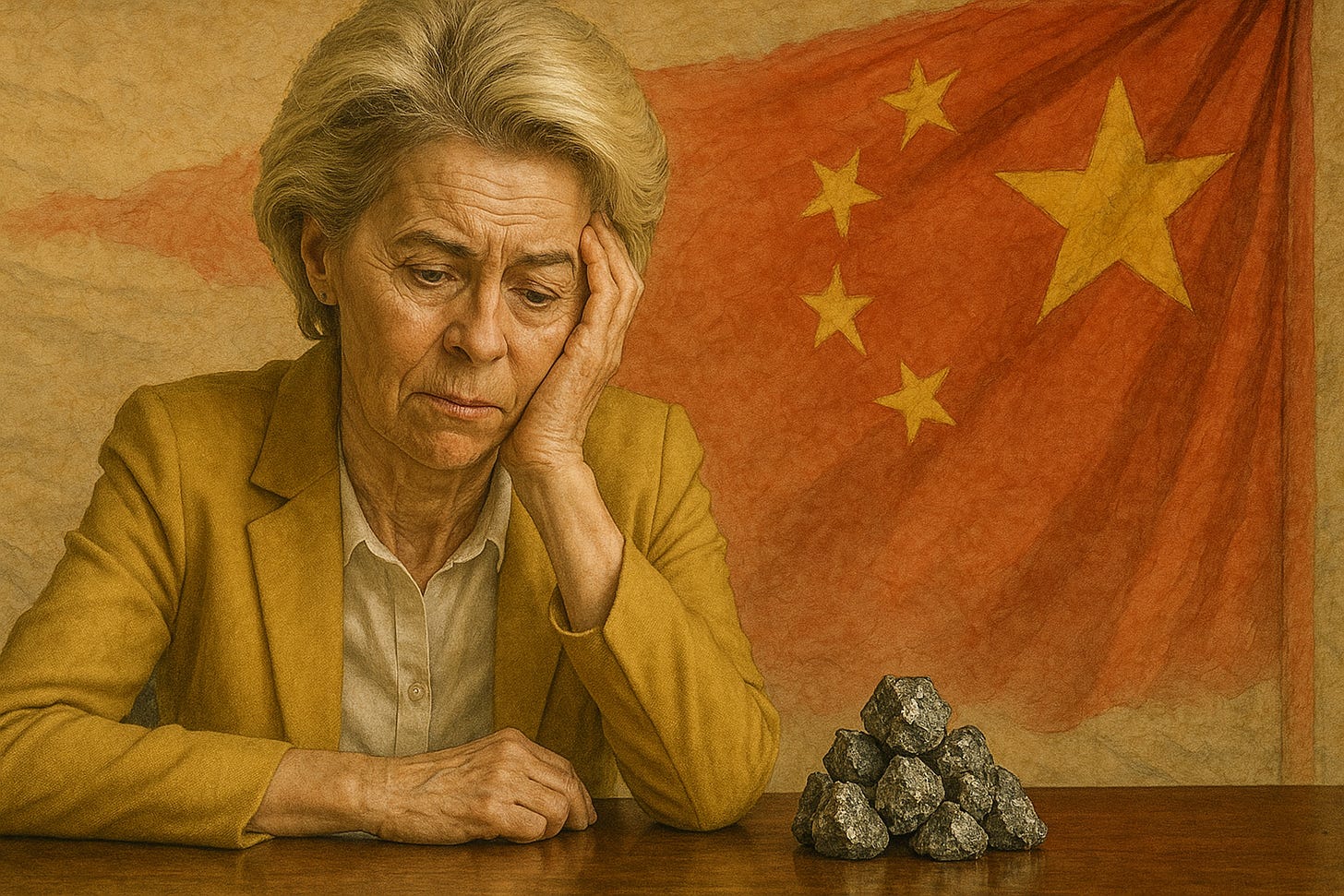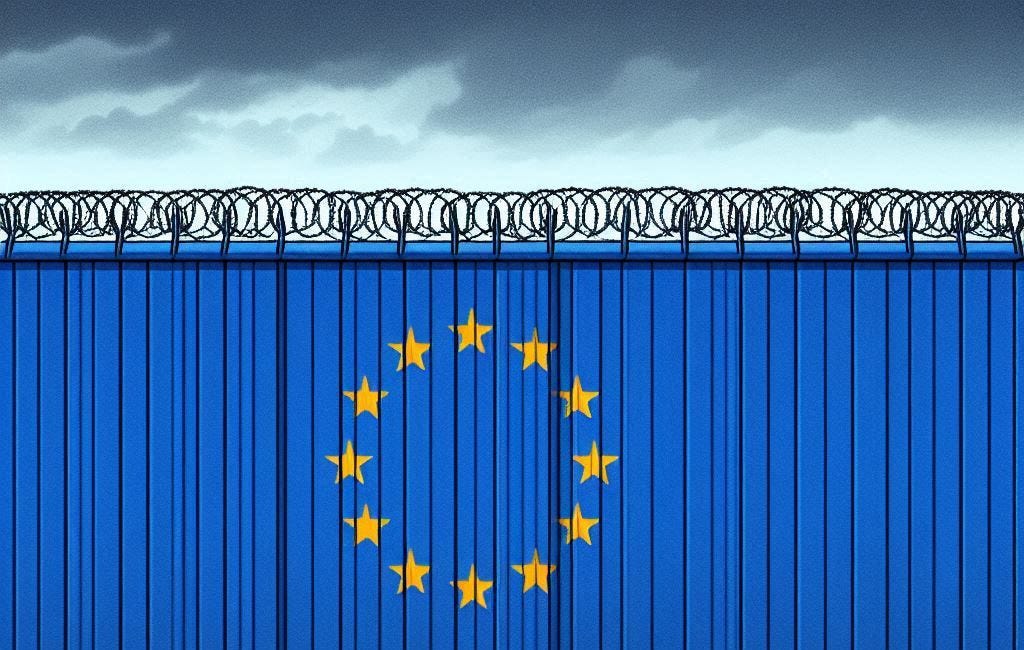The EU's "Rare Earth Anxiety" According to Zhao Junjie
"The anxiety and helplessness the EU has displayed over the rare earth issue reveal the contradictions and dilemmas at the heart of its policy towards China."
Sinification often highlights the more thought-provoking strands of debate in China. Zhao Junjie’s piece, by contrast, sits squarely within official messaging: casting export controls as routine, warning Western countries against “politicising” supply chains, and depicting Europe as stuck meekly in America’s shadow. Yet his views speak to a distinct exasperation and certain disdain for the EU that is widespread in Chinese thinking.
After Trump came to power this year, many in Europe expected China to court the EU more actively. Beijing did proffer what it saw as a meaningful olive branch, lifting sanctions against Members of the European Parliament in April. But for the EU, this was a prerequisite starting point, not a concession, and disillusionment deepened as the year wore on: no meaningful concessions were made and the anniversary summit in July was a widely anticipated flop.
Why, then, was European optimism at the start of the year perhaps misplaced? Put simply, Beijing assessed that it could manage Trump and saw little reason to take EU strategic autonomy (away from America) seriously.
Although Europeans themselves are often pessimistic about the EU’s geopolitical heft, Zhao takes the emphasis on Europe’s “helplessness” (无奈) a step further.
The confidence on display in Zhao’s piece reflects Beijing’s broader reluctance to move an inch in negotiations with Brussels — a stance he crystallises in his concluding admonition that “European leaders would be well advised to think twice [三思而后行] and handle bilateral relations with China in a rational and prudent manner.”
Though often unfair, if not misguided, Zhao’s commentary contains a few uncomfortable barbs — noting, for instance, that Europe’s rare-earth predicament is partly of its own making, the result of years spent offshoring resource-intensive industry to developing countries.
His forewarning of a US-China détente is especially jarring. “When” — not ‘if’ — “China and the United States reach a consensus or reconcile, the EU will find itself in an increasingly awkward position”, he insists.
— Jacob Mardell
Key Points
Europe’s fixation on the rare earth issue reflects Brussels’ deep strategic anxiety rather than a purely economic concern.
The vulnerability is largely self-inflicted, after years of offshoring dirty, resource-intensive industries to developing countries.
Instead of industrial power, Europe chose to leverage its market size and wield regulations to project normative power globally.
Europe’s vulnerability is real, but precisely because of this, it should avoid politicising the rare earth question and overextending the concept of national security — that it continues to do so is symptomatic of its arrogance.
I, Thomas, will be in Beijing for the next few weeks, with a short stay in Shanghai.
If you would like to meet — whether to exchange views or simply say hello — please feel very welcome to get in touch.
Washington prioritises its own interests and sees the EU as a strategic pawn; if Europeans continue to follow the US in criticising China, they will gain little in return.
Facing multiple social and economic crises at home, the EU should focus on confronting its own systemic flaws rather than externalising blame onto China.
Aggravating tensions over rare earths mainly serves to distract from domestic problems, while squandering opportunities for pragmatic cooperation between the EU and China.
The Author
Name: Zhao Junjie (赵俊杰)
Born: Nov. 1963 (62)
Position: Honorary Research Fellow, Institute of European Studies, Chinese Academy of Social Sciences (CASS)
Other positions: Professor, School of International Political Economy, University of Chinese Academy of Social Sciences
Previously: Researcher, Institute of European Studies, CASS (1991-2024)
Research focus: European international relations;China-Europe relations
Education: LL.B Peking University (1985); LL.M Renmin University (1988); PhD Renmin University (1991)
Experience abroad: Senior visiting scholar at the University of California, Berkeley (1997–1998); senior visiting scholar at CEPS in Brussels
ZHAO JUNJIE: TO ALLEVIATE ITS “RARE EARTH ANXIETY”, THE EU SHOULD FIRST PUT ASIDE ITS PRIDE
Zhao Junjie (赵俊杰)
Published by Global Times on 27 October 2025
Translated by Jan Brughmans
(Illustration by OpenAI’s DALL·E 3)
Recent developments in Europe concerning the issue of rare earths have attracted considerable attention. Some senior EU officials have claimed [宣称] that China’s [export] control measures are “unreasonable and harmful” [Note: “不合理且有害”; rather than “unreasonable”, the EU Trade Commissioner called them “unjustified and harmful”], while Germany’s Handelsblatt went further, stressing that Europe’s patience over the rare earths issue has reached its limit. Germany, France, and Poland are reportedly considering retaliatory measures, including the imposition of additional tariffs on China and the introduction of investment reviews — the so-called “nuclear options” [“核选项”].
The rare earth issue seems to be a continuation of last year’s tariff confrontation between the EU and China—a high-stakes struggle for strategic industrial dominance—but in reality, it extends far beyond that. It is undeniable that European countries are heavily dependent on rare earths yet lack autonomy in securing key materials. In view of this vulnerability, Europe should neither create obstacles nor engage in petty manoeuvring [使绊子、耍心眼] in its economic and trade cooperation with China, nor should it resort to threats and reproach [威胁责备] in bilateral negotiations.
Europe’s excessive focus on and hype surrounding the rare earth issue precisely reflect the strategic anxiety of its leadership and also mirror the so-called “Brussels effect”. For years, in pursuit of greater economic gains and environmental protection, developed European nations have relocated resource-intensive and high-energy industries to developing countries, thereby turning the rare earth sector into one of Europe’s major vulnerabilities. Conversely, Europe has placed strong emphasis on expanding its soft power through regulatory influence—from addressing global climate change to promoting European norms, and from setting various standards to practising values-based diplomacy. The EU has effectively become a global rule-maker [主导者] and legislator [立法者] in technological innovation, industrial transformation, and green development.
The concepts of “Normative Power Europe” and the “Brussels Effect” were introduced by British and American scholars. They encapsulate how the EU employs soft power to enhance its global influence—by formulating and exporting European regulations and standards, thereby spreading European influence worldwide. For instance, through its “normative power” [“欧洲规范性力量”], the EU has in recent years introduced and promoted globally a series of regulatory frameworks, including the General Data Protection Regulation (GDPR), the Framework Convention on Artificial Intelligence, the Critical Raw Materials Act,, and the Anti-Coercion Instrument. Leveraging its unified single market, vast consumer base, and considerable economic influence, many countries have been compelled to implement corresponding legislative reforms and align their systems with EU regulations, thereby following the European-led “Brussels Effect”.
Returning to the issue of rare earths, in an attempt to pressure China into concessions [让步], the European Union is preparing to wield [意欲祭出] its “trump cards” [“杀手锏”]—the Anti-Coercion Instrument and the Regulation on Prohibiting Products Made with Forced Labour on the Union Market, among others. Yet can the EU truly afford the consequences of politicising the rare earth question and overextending the concept of national security [泛化国家安全]? Europe’s structural shortage of critical materials is unlikely to be resolved in the short term, and the situation has already become urgent [燃眉之急]. Nevertheless, Brussels continues to cling to its pride rather than engaging in constructive dialogue with China. Some have even gone so far as to level unfounded accusations [against us] [横加指责]—a reflection of the West’s deep-seated arrogance.
At present, certain countries in Europe and North America view China as a “challenge to the Western hegemonic system” [西方霸权体系]. A small number of European countries and politicians, viewing matters through the prism of the “transatlantic alliance”, have opted to smear and exert pressure [抹黑、施压] on China. On the surface, this may appear to be a coordinated effort by the United States and Europe to contain [遏制] China—but in reality, it is not. Washington’s adherence to its “America First” doctrine ensures that the United States will continue to exploit Europe rather than genuinely consider the EU’s own interests. Should the EU persist in following others’ lead in attempts to constrain [遏压] China, it will gain little benefit; and when the day comes that China and the United States reach a consensus or reconcile [握手言和], the EU will find itself in an increasingly awkward position [尴尬].
Europe’s economy and society are currently facing recovery difficulties [复苏困境] and multiple crises [多重危机]. What is urgently needed is for Europe’s elites [精英阶层] to confront the flaws of the capitalist system head-on and to adopt a strategic approach akin to China’s reform and opening-up, rather than clinging to the past [抱残守缺] and persisting in self-deluding arrogance and prejudice. In fact, the anxiety [焦虑] and helplessness [无奈] the EU has displayed over the rare earth issue reveal the contradictions and dilemmas at the heart of its policy towards China.
The EU is caught between its desire to contain China and its need to cooperate with it. Though it claims to be “de-risking” [“去风险”] from China, it remains dependent on Chinese rare earths. Driven by the logic of maintaining Western hegemony [西方霸权], the EU may share a strategic consensus with its transatlantic ally in curbing China’s rise—but in Washington’s eyes, the EU is, at best, a strategic pawn [战略棋子]. In fact, even Washington is cautious about mentioning “decoupling” [“脱钩”] from China; for Europe, with its far deeper economic entanglement, talk of “breaking supply chains” [断链] is all the more unrealistic.
Looking at Europe today, the “America First” brand of trade protectionism has dealt a serious blow to European exports. Geopolitical conflicts, the energy crisis, and supply chain shortages have severely undermined Europe’s competitiveness and economic recovery. Faced with mounting internal and external pressures, the European Union ought to [本应] focus on economic transformation and structural reform, rather than directing its frustrations at China or resorting to a policy of threats and pressure.
Such actions would only invert priorities [本末倒置], undermine the very foundations of China–EU relations, and squander valuable opportunities for cooperation. It forces us to ask a deeper question: can confrontation with China truly bring benefits to European society and people’s livelihoods—or is it merely a way to deflect domestic tensions and distract public attention? The Chinese government has consistently upheld the principles of mutual benefit [互利互惠] and win–win cooperation [合作共赢] in its diplomacy with Europe. At a time when Europe faces an acute shortage of rare earth supplies, European leaders would be well advised to think twice [三思而后行] and handle bilateral relations with China in a rational and prudent manner.
READ MORE
EU Tariffs: How China Should Respond (Part 1)
“As long as our car manufacturers stabilise their positions, lay down solid foundations, hone their skills diligently and make steady progress, we will eventually stand invincible regardless of how the other side adjusts its policies and suppresses us. We must have this confidence.” — Jian Junbo







